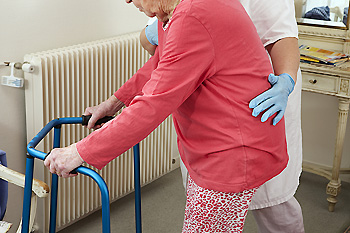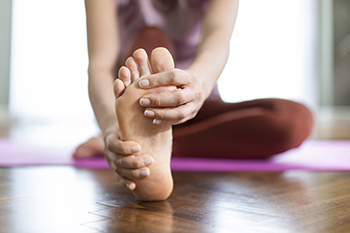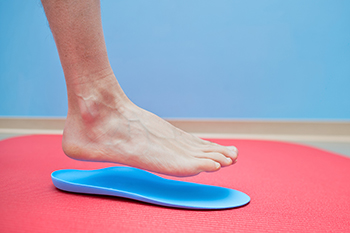Connect With Us
Blog
Items filtered by date: February 2023
Preventing Falls in the Bedroom

As people age, they can become increasingly susceptible to suffering from some kind of fall. As a result, a senior might experience diminished foot health. Therefore, it is important to do whatever you can to prevent these falls or trips from occurring in the first place. One of the places where a senior might fall down is in their bedroom. There are several steps that can be taken to minimize falls in a senior’s bedroom. For example, many falls are due simply to a lack of light in the relevant area. So a senior might consider buying a bedside lamp to illuminate the bedroom floor. Additionally, a senior might consider ensuring that the bed is at an appropriate height. Beds that are too high might result in falls while getting out. Lastly, since some seniors are light-headed when they first wake up, a senior might consider trying to minimize falls by taking their time to rise. It is suggested that you contact a podiatrist for more information on preventing falls.
Preventing falls among the elderly is very important. If you are older and have fallen or fear that you are prone to falling, consult with Imaze Marian Davis, DPM from Marian Davis, DPM, PA. Our doctors will assess your condition and provide you with quality advice and care.
Every 11 seconds, an elderly American is being treated in an emergency room for a fall related injury. Falls are the leading cause of head and hip injuries for those 65 and older. Due to decreases in strength, balance, senses, and lack of awareness, elderly persons are very susceptible to falling. Thankfully, there are a number of things older persons can do to prevent falls.
How to Prevent Falls
Some effective methods that older persons can do to prevent falls include:
- Enrolling in strength and balance exercise program to increase balance and strength
- Periodically having your sight and hearing checked
- Discuss any medications you have with a doctor to see if it increases the risk of falling
- Clearing the house of falling hazards and installing devices like grab bars and railings
- Utilizing a walker or cane
- Wearing shoes that provide good support and cushioning
- Talking to family members about falling and increasing awareness
Falling can be a traumatic and embarrassing experience for elderly persons; this can make them less willing to leave the house, and less willing to talk to someone about their fears of falling. Doing such things, however, will increase the likelihood of tripping or losing one’s balance. Knowing the causes of falling and how to prevent them is the best way to mitigate the risk of serious injury.
If you have any questions, please feel free to contact our office located in Miami, FL . We offer the newest diagnostic and treatment technologies for all your foot care needs.
Swollen Feet and Pregnancy

Pregnancy and swollen feet are linked, especially during the third trimester. Swollen feet may occur from decreased circulation and the blood becoming thicker during pregnancy. The growing fetus requires additional nutrients from the blood and may affect circulation too. Relief may be found when the feet are elevated and when gentle stretching exercises are performed. It is beneficial to reduce or eliminate salt intake, in addition to drinking plenty of water daily. Walking is a suggested method to increase blood circulation. It is important to wear comfortable shoes as this can make it more appealing to walk. Compression stockings may help the blood flow easier from the heart to the feet. Please consult a podiatrist for more information on finding relief from swollen feet during pregnancy.
Pregnant women with swollen feet can be treated with a variety of different methods that are readily available. For more information about other cures for swollen feet during pregnancy, consult with Imaze Marian Davis, DPM from Marian Davis, DPM, PA. Our doctors will attend to all of your foot and ankle needs.
What Foot Problems Can Arise During Pregnancy?
One problem that can occur is overpronation, which occurs when the arch of the foot flattens and tends to roll inward. This can cause pain and discomfort in your heels while you’re walking or even just standing up, trying to support your baby.
Another problem is edema, or swelling in the extremities. This often affects the feet during pregnancy but tends to occur in the later stages.
How Can I Keep My Feet Healthy During Pregnancy?
- Wearing orthotics can provide extra support for the feet and help distribute weight evenly
- Minimize the amount of time spent walking barefoot
- Wear shoes with good arch support
- Wear shoes that allow for good circulation to the feet
- Elevate feet if you experience swelling
- Massage your feet
- Get regular, light exercise, such as walking, to promote blood circulation to the feet
If you have any questions please feel free to contact our office located in Miami, FL . We offer the newest diagnostic and treatment technologies for all your foot and ankle needs.
Why Do My Toes Hurt?

Toe pain can be mildly irritating to debilitating. Common causes of toe pain are arthritis, bunions, and nail conditions. Such pain can come on suddenly or develop over time. As tiny as toes are, they contain a total of 14 bones, as well as joints, muscles, tendons, ligaments, nerves, and blood vessels. All these things can become injured, infected, or prone to other conditions that cause pain. Arthritis can lead to stiffness, swelling, and pain in toe joints. A bunion is a bony growth on the outside of the big toe joint that can cause irritation and deformity. An ingrown toenail can cause pain, especially when it rubs against a shoe and is infected. If you experience persistent toe pain, visit a podiatrist who can diagnose the problem and provide treatment for relief.
Toe pain can disrupt your daily activities. If you have any concerns, contact Imaze Marian Davis, DPM of Marian Davis, DPM, PA. Our doctors can provide the care you need to keep you pain-free and on your feet.
What Causes Toe Pain?
Most severe toe pain is caused due to a sports injury, trauma from dropping something heavy on the toe, or bumping into something rigid. Other problems can develop over time for various reasons.
Toe pain can be caused by one or more ailments. The most common include:
- Trauma
- Sports injury
- Wearing shoes that are too tight
- Arthritis
- Gout
- Corns and calluses
- Hammertoe
- Bunions
- Blisters
- Ingrown toenails
- Sprains
- Fractures (broken bones)
- Dislocations
When to See a Podiatrist
- Severe pain
- Persistent pain that lasts more than a week
- Signs of infection
- Continued swelling
- Pain that prevents walking
Diagnosis
In many cases the cause of toe pain is obvious, but in others, a podiatrist may want to use more advanced methods to determine the problem. These can range from simple visual inspections and sensation tests to X-rays and MRI scans. Prior medical history, family medical history, and any recent physical traumatic events will all be taken into consideration for a proper diagnosis.
Treatment
Treatments for toe pain and injuries vary and may include shoe inserts, padding, taping, medicines, injections, and in some cases, surgery. If you believe that you have broken a toe, please see a podiatrist as soon as possible.
If you have any questions please feel free to contact our office located in Miami, FL . We offer the newest diagnostic tools and technology to treat your foot and ankle needs.
Several Reasons Why Orthotics Are Worn

Podiatrists often prescribe orthotics that may help various foot conditions. The joints in the feet and ankle undergo stress while walking and running, and wearing orthotics may help to relieve some of this pressure. Many patients have found they are able to walk or run faster, and this may be a result of the shock absorption that can come from wearing orthotics. Diabetic patients can benefit from wearing orthotics, which may help to prevent injuries that can happen from the inability to feel nerve damage. Additionally, orthotics may help to distribute the body’s weight evenly, possibly preventing corns and calluses from developing. If you have any type of foot condition, it is strongly suggested that you are under the care of a podiatrist who can determine if orthotics are right for you.
If you are having discomfort in your feet and would like to try orthotics, contact Imaze Marian Davis, DPM from Marian Davis, DPM, PA. Our doctors can provide the care you need to keep you pain-free and on your feet.
What Are Orthotics?
Orthotics are inserts you can place into your shoes to help with a variety of foot problems such as flat feet or foot pain. Orthotics provide relief and comfort for minor foot and heel pain but can’t correct serious biomechanical problems in your feet.
Over-the-Counter Inserts
Orthotics come in a wide variety of over-the-counter inserts that are used to treat foot pain, heel pain, and minor problems. For example, arch supports can be inserted into your shoes to help correct overarched or flat feet, while gel insoles are often used because they provide comfort and relief from foot and heel pain by alleviating pressure.
Prescription Orthotics
If over-the-counter inserts don’t work for you or if you have a more severe foot concern, it is possible to have your podiatrist prescribe custom orthotics. These high-quality inserts are designed to treat problems such as abnormal motion, plantar fasciitis, and severe forms of heel pain. They can even be used to help patients suffering from diabetes by treating foot ulcers and painful calluses and are usually molded to your feet individually, which allows them to provide full support and comfort.
If you are experiencing minor to severe foot or heel pain, it’s recommended to speak with your podiatrist about the possibilities of using orthotics. A podiatrist can determine which type of orthotic is right for you and allow you to take the first steps towards being pain-free.
If you have any questions please contact our office located in Miami, FL . We offer the newest diagnostic and treatment technologies for all your foot and ankle needs.


